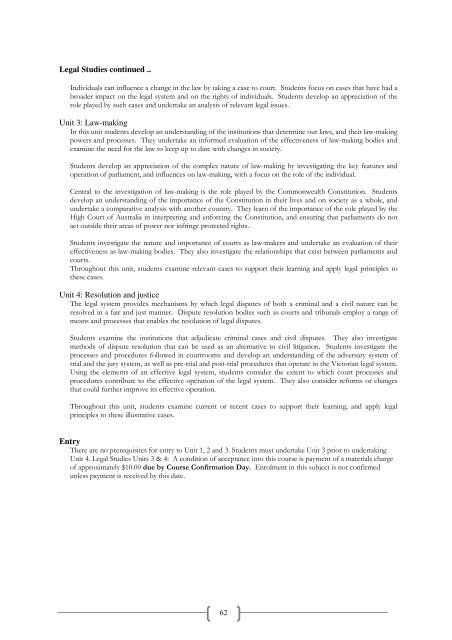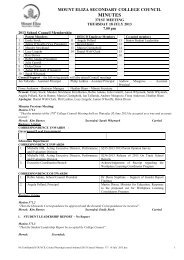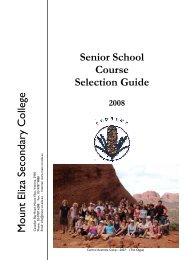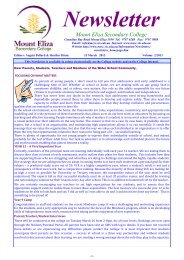9-12 Course Selection Guide - Mount Eliza Secondary College
9-12 Course Selection Guide - Mount Eliza Secondary College
9-12 Course Selection Guide - Mount Eliza Secondary College
You also want an ePaper? Increase the reach of your titles
YUMPU automatically turns print PDFs into web optimized ePapers that Google loves.
Legal Studies continued ..Individuals can influence a change in the law by taking a case to court. Students focus on cases that have had abroader impact on the legal system and on the rights of individuals. Students develop an appreciation of therole played by such cases and undertake an analysis of relevant legal issues.Unit 3: Law-makingIn this unit students develop an understanding of the institutions that determine our laws, and their law-makingpowers and processes. They undertake an informed evaluation of the effectiveness of law-making bodies andexamine the need for the law to keep up to date with changes in society.Students develop an appreciation of the complex nature of law-making by investigating the key features andoperation of parliament, and influences on law-making, with a focus on the role of the individual.Central to the investigation of law-making is the role played by the Commonwealth Constitution. Studentsdevelop an understanding of the importance of the Constitution in their lives and on society as a whole, andundertake a comparative analysis with another country. They learn of the importance of the role played by theHigh Court of Australia in interpreting and enforcing the Constitution, and ensuring that parliaments do notact outside their areas of power nor infringe protected rights.Students investigate the nature and importance of courts as law-makers and undertake an evaluation of theireffectiveness as law-making bodies. They also investigate the relationships that exist between parliaments andcourts.Throughout this unit, students examine relevant cases to support their learning and apply legal principles tothese cases.Unit 4: Resolution and justiceThe legal system provides mechanisms by which legal disputes of both a criminal and a civil nature can beresolved in a fair and just manner. Dispute resolution bodies such as courts and tribunals employ a range ofmeans and processes that enables the resolution of legal disputes.Students examine the institutions that adjudicate criminal cases and civil disputes. They also investigatemethods of dispute resolution that can be used as an alternative to civil litigation. Students investigate theprocesses and procedures followed in courtrooms and develop an understanding of the adversary system oftrial and the jury system, as well as pre-trial and post-trial procedures that operate in the Victorian legal system.Using the elements of an effective legal system, students consider the extent to which court processes andprocedures contribute to the effective operation of the legal system. They also consider reforms or changesthat could further improve its effective operation.Throughout this unit, students examine current or recent cases to support their learning, and apply legalprinciples to these illustrative cases.EntryThere are no prerequisites for entry to Unit 1, 2 and 3. Students must undertake Unit 3 prior to undertakingUnit 4. Legal Studies Units 3 & 4: A condition of acceptance into this course is payment of a materials chargeof approximately $10.00 due by <strong>Course</strong> Confirmation Day. Enrolment in this subject is not confirmedunless payment is received by this date.62







